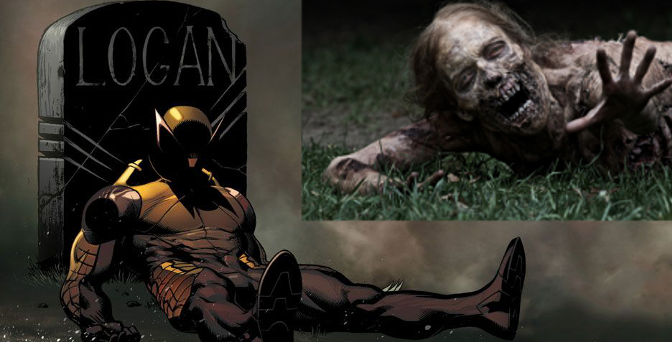(1st Editor’s Note: This is a repost from our now defunct Entertainment Compendium site.)
(2nd Editor’s Note: Spoiler Alert: Wolverine dies’.or he already died.)
Either way, you would think that the death of one of Marvel’s most popular characters would cause more of an uproar than I’ve seen. Granted, I’m not as involved in comics as I used to be, but through my various social media outlets I’m connected enough to know that giving Thor a sex change over the summer created quite a fuss. Heck, when Kirkman killed off Glenn in The Walking Dead (spoiler alert!) last year, people went nuts and were going to boycott pretty much everything. Why, then, does nobody seem to care that Wolverine is either going to die or already dead? I talked about this with Chris and his theory was that comic book (and soap opera, if that’s your thing) deaths rarely stick for very long and that they will most likely bring him back in a year or so. I have heard that theory mentioned elsewhere and admit that it holds some water. However, I think that there’s more to it than just comic death fatigue.
There are two reasons that I think this and they are essentially the same. I will first go back to a lesson from history, The Death of Superman. This story is now over 20 years old and has since been reversed at least twice, but at the time it was a huge deal. DC was killing one of the faces of their franchise and the symbol of truth, justice, and the American way. Comic fans counted down the issues until the big event, the news covered it like it was an actual celebrity death, and DC even followed up with a tribute called Funeral for a Friend. Everyone knew that the death would be temporary. Sure, they faked it well by introducing four new ?Supermen? to take his place, but no way would DC actually allow Superman to stay dead. Still, everyone played along and enjoyed the ride.
The other example is more recent and I mentioned it earlier. Last year, the creator of The Walking Dead Robert Kirkman killed off Glenn in a very violent and (some would say) unnecessary fashion. Relax, fans of the television show, he said that the character is much too popular to do the same on TV. That statement speaks to the point of this article, but you must know by now that it will take a bit longer to get there. The internet became very angry about Glenn’s death. Fans threatened to never buy the comic again. Some went as far as to call both Kirkman and those who didn’t join the boycott sadists and far worse. Internet rage is not a new thing, but given the lukewarm reception of Wolverine’s death, I find the juxtaposition interesting. Especially when you consider that the title of the book is ?The Walking Dead? and that doesn’t refer just to the zombies.
Superman dies and he gets national coverage. Glenn dies and he is supported by the combined rage of the internet. Wolverine dies and his legacy is met with a collective yawn. Heck, even Thor’s sex change got more play than poor Wolvie. So, what gives? I think that a big part of it lies in Robert Kirkman’s assurance to everyone that TV Glenn is safe. Comic books were big in the 1990s. They have their roots in counter culture and blossomed through the love and admiration of young awkward boys who wanted to be heroes themselves. Those boys grew up and had their own money and comic books became so popular in the 1990s that several of the lesser known companies became big names and one company even sprouted from the ire that several artists and writers felt towards the big two. While collecting and reading comics might have still been considered a nerdy hobby, the internet showed that there were many nerds and some of theme were even conspiring to change the world.
Nerds grew up more and got married (sometimes to other nerds) and had nerd babies that are now growing up and discovering the wonderful worlds available to them. I ask the rhetorical question again in a different way. What happened? Comic books should be more popular than ever. This strange off shoot of comic book ?culture? is more popular than ever. Movies and television shows based on the most obscure heroes become huge successes. Two coastal comic conventions (that have little to do with actual comics other than the ?culture?) do huge business along with countless other local and cousin, like gaming conventions, draw massive crowds and continue to grow.
What happened to comics that even a die hard fan who collected as recently as Civil War (admittedly not all that recent) has completely given up on them? The 90s were the best of times for comics, as illustrated (pun intended) above. They were also the worst of times. All of those companies vying for what is ultimately a niche marked caused oversaturation of the market. The same happened with baseball cards. I was burned by the promised collectability of both and both have since been recycled. The quality of writing and art suffered as they tried to find more artists for the new titles and it seems that they never learn their lessons and repeat this pattern every 10 years or so. Comic books ahve also become very expensive. I often joke that it’s no wonder that half of this country is illiterate because nobody can afford to read. Seven years ago when I collected last, books were $1.99, sometimes $2.49 and the ?big? issues were $4.99. A quick check of the Midtown Comics web page shows that many of the books now retail for $3.99 and $4.99. That’s twice as much as I used to pay for a paper back novel (When I was your age’) and more than a booster pack of Magic cards. I can buy a comic that I will read once or 15 cards that I will use on a monthly basis. As the prices rise, other hobbies rise to capture those dollars, and the ?culture? is able to more accurately capture the spirit of the comics in other media, comics sadly decline.
Superman died during a resurgence of the Golden Age of comics. Glenn died and is a part of a show that isn’t shy about killing some of the most loved characters, but he had a rabid television audience. The feminine side of Thor could easily pollute the next movie that comes out. Wolverine is dying in a medium that has been slowly dying for years, but few seem to care. I’m a bit of a doomsayer when it comes to all print publishing (especially textbooks, those *******s need to die), but I honestly believe that print and all associated need to change or go extinct. As long as people are confident that Hugh Jackman (or someone else, if they decide to reboot since that’s big now) will pop those claws in the latest summer blockbuster, then nobody will care than he’s being killed for a year or so in the funny pages.

